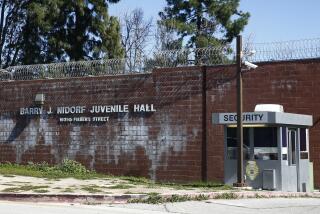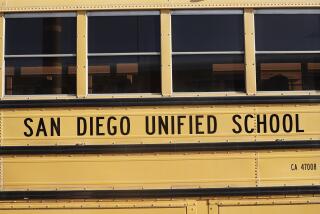Changes at Juvenile Court Schools Urged : Education: The county superintendent says many of the grand jury’s requests for the facilities are not financially feasible.
SANTA ANA — The Orange County Grand Jury on Friday called for major changes in the county’s 11 juvenile court schools.
Some of the most significant suggestions, however, were immediately rejected by the county school superintendent as financially unfeasible.
“Anything that has to do with money is a killer,” Superintendent John F. Dean said. “There’s a bottom of the financial well, and we’ve hit it.”
Among the report’s major recommendations were that full-time principals and counselors be hired for each of the schools, that the number of instructional aides be increased and that various safety measures be implemented, including training teachers in crisis and violence management and the installation of alarm systems.
“We are saying they’re doing a hell of a job with what materials and resources they have, but that improvements need to be made,” said Jim Cooper, chairman of the grand jury’s juvenile services/education committee, which spent six months preparing the report. “These schools make up one of the most unique school systems that most people will ever experience, and we felt that this was a particular area of education in Orange County that needed to be given a hard look.”
About 7,000 students pass annually through the 11 juvenile court schools operated by the Orange County school district. While 85% of them are juvenile offenders charged with serious crimes, the report said, 15% are victims of child abuse ordered into the system for their own protection.
“They make up a very interesting body of students,” Cooper said. While some of the juvenile court schools are institutions at which the students live around the clock, he said, others are daytime facilities to which they commute. Whatever the case, Cooper said, “this is extremely important because these are their schools of last resort.”
In reacting to the report, Dean said some of the schools have too few teachers and students to support the expense of a principal.
“It’s hard to justify a principal for four teachers and 60 kids,” he said. “If the public looked at that, I think they would say, ‘Come on, you don’t need it.’ ”
In response to the idea of hiring more counselors and teachers’ aides, Dean said, “I would love to have more help, and we will put those people in as soon as we can afford it.”
Regarding training teachers to cope with violence, as the crimes for which youthful offenders are convicted become more violent, Dean said the district already does that.
And, he said, funding is being sought to equip each teacher in a juvenile court school with a walkie-talkie to report any problems.
“Buzzer alarms are not as effective as walkie-talkies,” said John Peshkoff, director of the juvenile court schools system, regarding the report’s recommendation. “We’re more interested in having a good communications system.”
The grand jury report inspired at least one political response from a candidate planning to challenge Dean in the June 7 election.
“It validates my concerns about the problems in the leadership down there,” said Darrell Opp, chief educational officer of the Central County Regional Occupational Program. “If we had sufficient (financial) reserves, it would” pay for all this.
More to Read
Sign up for Essential California
The most important California stories and recommendations in your inbox every morning.
You may occasionally receive promotional content from the Los Angeles Times.










